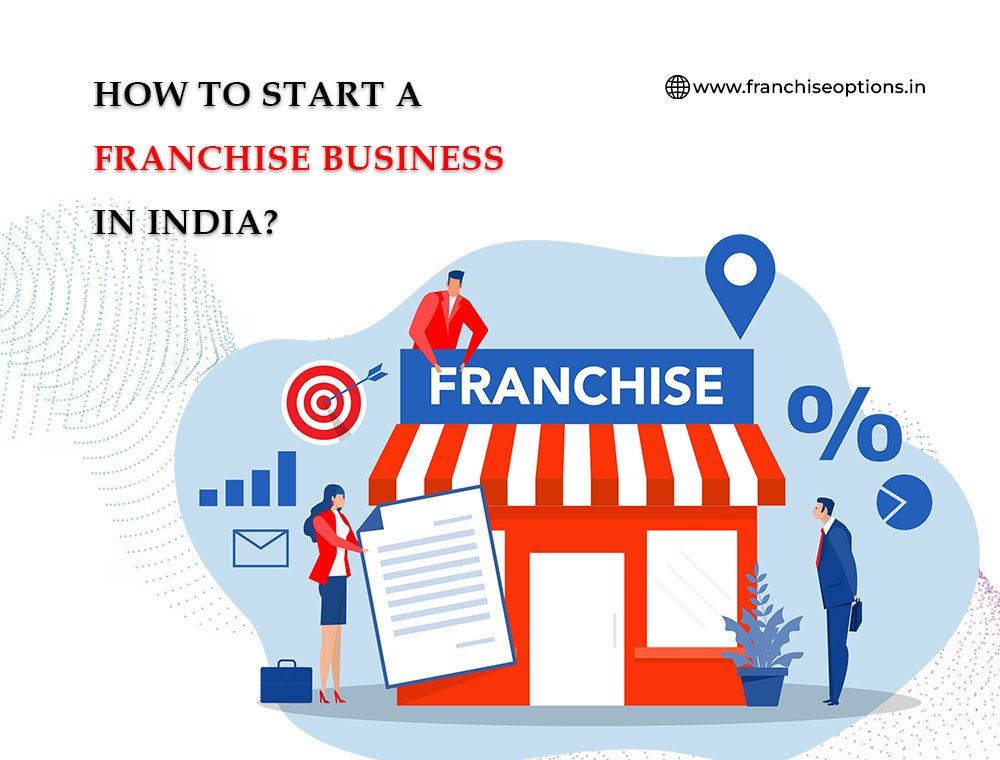Blog Views: 172
How to start a franchise business in India?
A franchise is a business model in which a franchisor grants a franchisee the right to operate a business using the franchisor's brand name, trademarks, and business methods. The franchisee pays a fee or royalties to the franchisor for the privilege of operating under their established brand and receives ongoing support and guidance in exchange.This arrangement allows the franchisee to benefit from the franchisor's brand recognition, proven business model, and support infrastructure while retaining a degree of independence in managing day-to-day operations.
It can take years for a new business in any industry to build reputation. With a franchise, you inherit the business reputation, along with a business plan that’s already proven successful.
Find the right franchise for you in 3 steps
Opening a franchise is less risky than building a business from the ground up because the business model has already proven successful. Follow these steps to choose the right one for you.
- Evaluate your area of interest.
- Find the right franchisor.
- Come to an agreement.
Understanding Franchises When a business wants to increase its market share or geographical reach at a low cost, it may franchise its product and brand name.
A franchise is a joint venture between a franchisor and a franchisee. The franchisor is the original business. It sells the right to use its name and idea. The franchisee buys this right to sell the franchisor's goods or services under an existing business model and trademark.
Franchises are a popular way for entrepreneurs to start a business, especially when entering a highly competitive industry such as fast food. One big advantage to purchasing a franchise is you have access to an established company's brand name. You won't need to spend resources getting your name and product out to customers. The franchise business model has a storied history in the United States.
The concept dates to the mid-19th century when two companies—the McCormick Harvesting Machine Company and the I.M. Singer Company—developed organizational, marketing, and distribution systems recognized as the forerunners to franchising. These novel business structures were developed in response to highUnderstanding Franchises When a business wants to increase its market share or geographical reach at a low cost, it may franchise its product and brand name. A franchise is a joint venture between a franchisor and a franchisee. The franchisor is the original business. It sells the right to use its name and idea. The franchisee buys this right to sell the franchisor's goods or services under an existing business model and trademark.
Franchises are a popular way for entrepreneurs to start a business, especially when entering a highly competitive industry such as fast food. One big advantage to purchasing a franchise is you have access to an established company's brand name. You won't need to spend resources getting your name and product out to customers. The franchise business model has a storied history in the United States.
The concept dates to the mid-19th century when two companies—the McCormick Harvesting Machine Company and the I.M. Singer Company—developed organizational, marketing, and distribution systems recognized as the forerunners to franchising. These novel business structures were developed in response to high-volume production and allowed McCormick and Singer to sell their reapers and sewing machines to an expanding domestic market.-volume production and allowed McCormick and Singer to sell their reapers and sewing machines to an expanding domestic market. Advantages and Disadvantages of Franchises
Advantages - There are many advantages to investing in a franchise, and also drawbacks. Widely recognized benefits include a ready-made business formula to follow. A franchise comes with market-tested products and services, and in many cases established brand recognition. If you're a McDonald's franchisee, decisions about what products to sell, how to layout your store, or even how to design your employee uniforms have already been made. Some franchisors offer training and financial planning, or lists of approved suppliers. But while franchises come with a formula and track record, success is never guaranteed.
Disadvantages - Disadvantages include heavy start-up costs as well as ongoing royalty costs. To take the McDonald’s example further, the estimated total amount of money it costs to start a McDonald’s franchise ranges from $1.3 million to $2.3 million, on top of needing liquid capital of $500,000.
By definition, franchises have ongoing fees that must be paid to the franchisor in the form of a percentage of sales or revenue. This percentage can range between 4.6% and 12.5%, depending on the industry.
For uprising brands, there are those who publicize inaccurate information and boast about ratings, rankings, and awards that are not required to be proven. So, franchisees might pay high dollar amounts for no or low franchise value.
Franchisees also lack control over territory or creativity with their business. Financing from the franchisor or elsewhere may be difficult to come by. Other factors that impact all businesses, such as poor location or management, are also possibilities.
Pros
Ready-made business formula
Market-tested products and services
Established brand recognition
Large decisions already made
List of approved suppliers
Training and financial planning provided
Cons
Success not guaranteed
Large start-up costs
Ongoing fees
Lack of territory choice
Lack of creative control
Franchise vs. Startup
If you don't want to run a business based on someone else's idea, you can start your own. But starting your own company is risky, though it offers rewards both monetary and personal. When you start your own business, you're on your own. Much is unknown. "Will my product sell?", "Will customers like what I have to offer?", "Will I make enough money to survive?" The failure rate for new businesses is high. Two-thirds of businesses survive just two years, and 50% survive just five years. If your business is going to beat the odds, you alone can make that happen. To turn your dream into reality, expect to work long and hard hours with no support or expert training. If you venture out solo with little or no experience, the deck is stacked against you. If this sounds like too big a burden, the franchise route may be a wiser choice. People typically purchase a franchise because they see other franchisees' success stories. Franchises offer careful entrepreneurs a stable, tested model for running a successful business. On the other hand, for entrepreneurs with a big idea and a solid understanding of how to run a business, launching your own startup presents an opportunity for personal and financial freedom. Deciding which model is right for you is a choice only you can make.
What Are the Advantages of Franchises?
Some of the widely recognized advantages of franchises include a ready-made business formula to follow, market-tested products and services, and, in many cases, established brand recognition. For example, if you're a McDonald's franchisee, decisions about what products to sell, how to layout your store, or even how to design your employee uniforms have already been made. Some franchisors offer training and financial planning, or lists of approved suppliers; however, despite these benefits, success is never guaranteed.
What Are the Risks of Franchises?
Disadvantages include heavy start-up costs as well as ongoing royalty costs. By definition, franchises have ongoing fees that must be paid to the franchisor in the form of a percentage of sales or revenue. This percentage can range between 4.6% and 12.5%, depending on the industry.
There is also the risk of a franchisee being duped by inaccurate information and paying high dollar amounts for no or low franchise value. Franchisees also lack control over territory or creativity with their business. Financing from the franchisor or elsewhere may be difficult to come by and franchisees could be adversely affected by poor location or management.
How Does the Franchisor Make Money?
Typically, a franchise agreement includes three categories of payment to the franchisor. First, the franchisee must purchase the controlled rights, or trademark, from the franchisor in the form of an upfront fee. Second, the franchisor often receives payment for providing training, equipment, or business advisory services. Finally, the franchisor receives ongoing royalties or a percentage of the operation's sales.
Steps to Start a Franchise Business
Step 1: Reaching out to the chosen Franchisor – You should bear in mind that every franchisor has different requirements in terms of documentation, fees, and business arrangements. Even if details are provided on their website, there might be other information which isn’t disclosed and talking to the franchisor directly would help you to keep yourself informed.
Step 2: Preparing and arranging the requirements – This is a crucial step. The requirements which you would be asked to provide could dictate whether or not the franchisor would approve the franchise application, so you must give proper heed to this step. Most of the franchisors have defined a set of requirements. However, below are some of the documents which are most common:
- Franchise application form completed in full, which you can find on the franchising company’s website. In case the form isn’t available, one could contact the company and get the same.
- Letter of Intent (LOI) which states the reasons for applying for the said franchise.
- Map of your proposed site of business. You could do it with the help of maps and you should also attach the pictures of the actual site too.
- Your updated resume/profile.
- At least two valid government ID proofs.
- If you would be renting the space for the business site, the lease contract or the written agreement with the lessor also needs to be provided.
- Latest bank statements.
- Taxpayer’s Identification Number (TIN).
- The franchise term, including the renewal term and costs for the same.
- Costs and fees such as the franchise fee and royalty fee.
- Grounds which might lead to termination of Franchise Agreement.
- Inclusions and exclusions in the franchise package.
- List of franchisor-approved products and suppliers.











